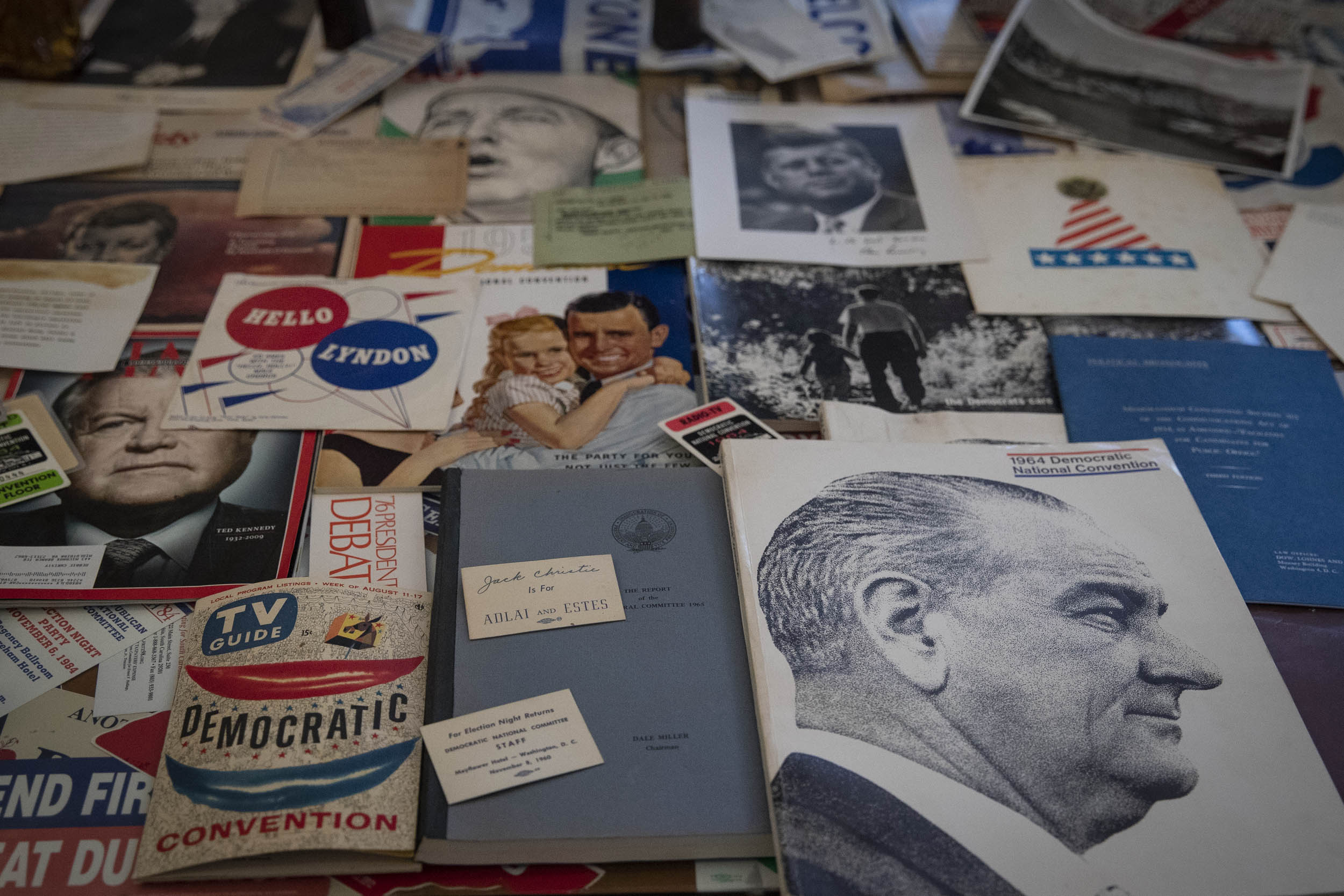The 400-plus items, spanning both political parties and seven presidential administrations, reflect one man’s lifelong passion for American politics.
Jack F. Christie was a World War II veteran, a former NBC broadcaster and Democratic National Committee administrator responsible for the logistics of the party’s huge national conventions. He was particularly close with President John F. Kennedy, having worked both on the young senator’s presidential campaign and as a liaison between the Kennedy White House and the Democratic National Committee.
When Christie died in 2008, his large collection of presidential memorabilia – including campaign and inauguration paraphernalia from both parties, original audio and video recordings, and his personal correspondence with politicians from around the country – needed a new home.
His nephew, Robert Christie, chose the University of Virginia’s Center for Politics.
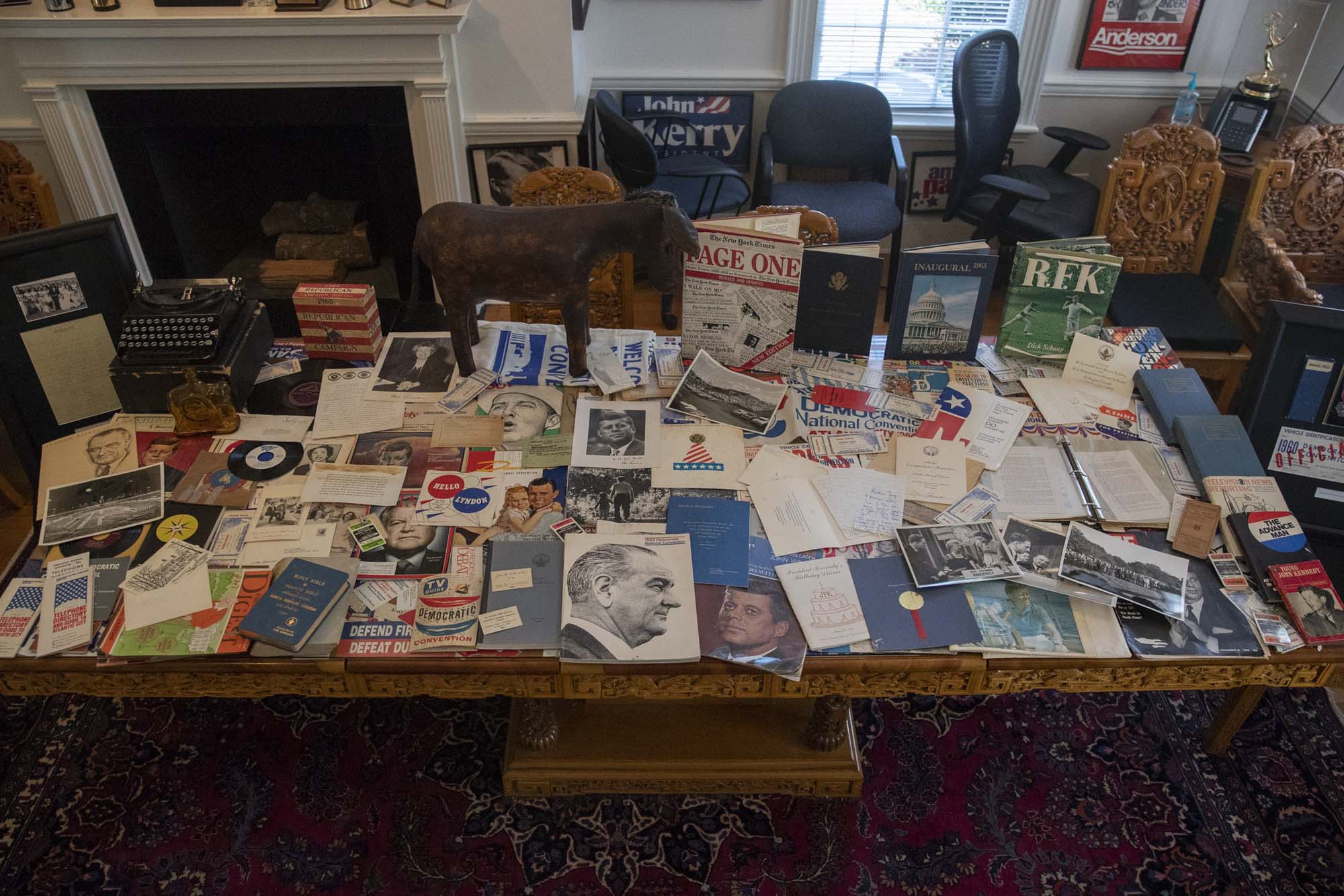
The materials on the table represent about a third of the donation, which the center received last week.
“My uncle wanted the collection to go where it would be shared among people interested in politics,” said the younger Christie, whose son is a UVA alumnus. “At UVA, it will be used by young people who are interested in politics – and we really need young people involved in politics.”
It is the largest private collection ever donated to the center and includes material from the Franklin D. Roosevelt, Truman, Eisenhower, Kennedy, Johnson, Nixon and Carter administrations.
“It is especially notable to have a collection spanning so many administrations,” Center for Politics Chief of Staff Ken Stroupe said.
Though faculty, staff and students are still combing through all of the items, they have already found gems including a photograph of the young Christie interviewing First Lady Eleanor Roosevelt at NBC, an elephant-shaped glass bottle etched with then-presidential candidate Richard Nixon’s face, and – one of Christie’s most prized items – the podium Bible used when Sen. John F. Kennedy accepted the Democratic Party’s nomination for president at the 1960 Democratic National Convention.
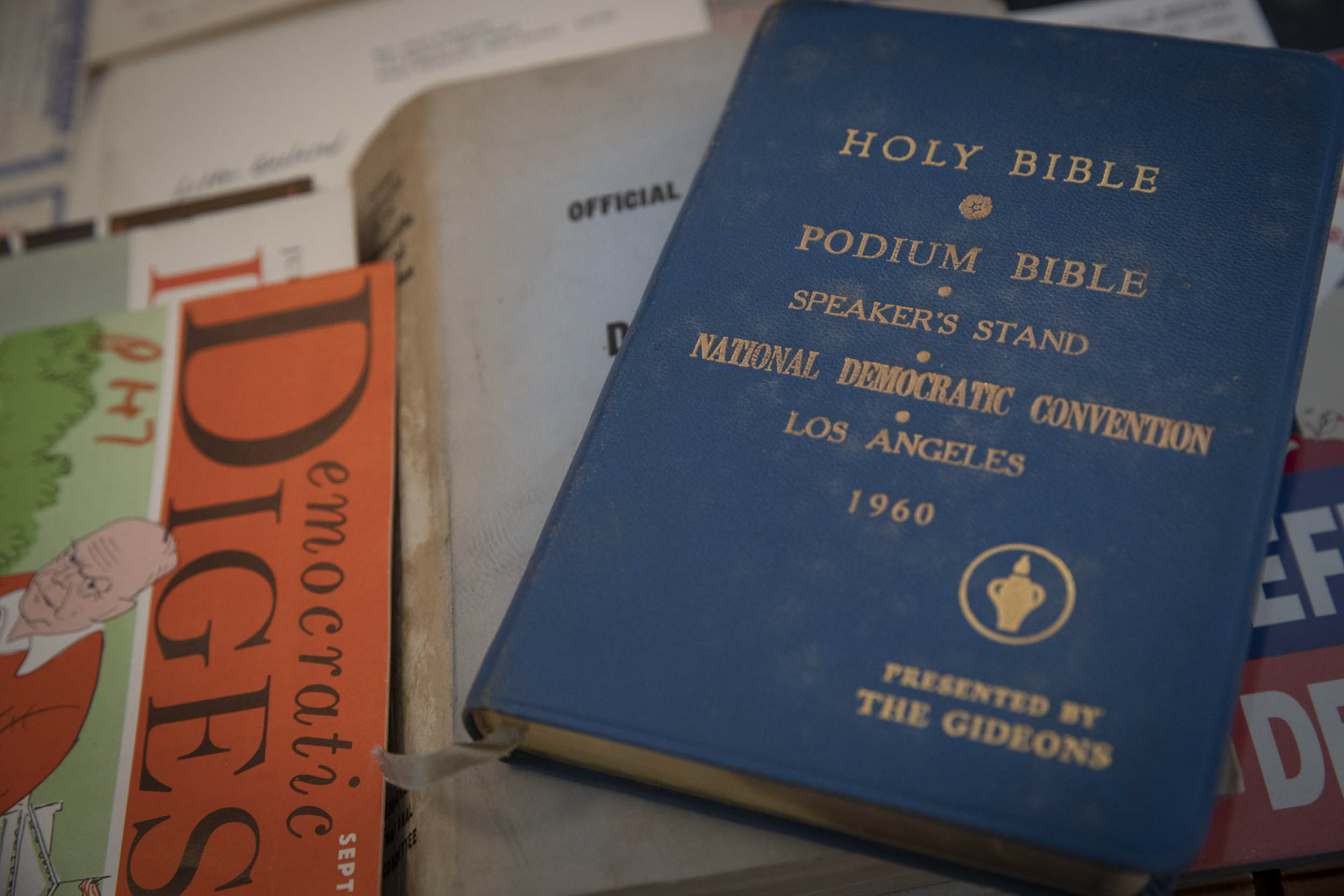
This Bible was on the podium when Sen. John F. Kennedy spoke after accepting his party’s nomination in 1960.
Robert Christie said his uncle was full of interesting stories, particularly about the Kennedy administration. He took a job with the Democratic National Committee in the mid-1950s, met JFK during the 1956 Democratic National Convention and helped to organize the 1960 convention in Los Angeles, where Kennedy accepted the nomination.
After Kennedy’s successful campaign, Christie worked closely with Kennedy’s White House in his role at the Democratic National Committee. He also kept up a years-long correspondence with crooner Frank Sinatra, a close friend of Kennedy’s who Christie met at the 1960 convention.
“My uncle was always telling us background stories, little things that happened behind the scenes with Kennedy,” he said. “They were both veterans, both young, and they just had a lot of respect for each other.”
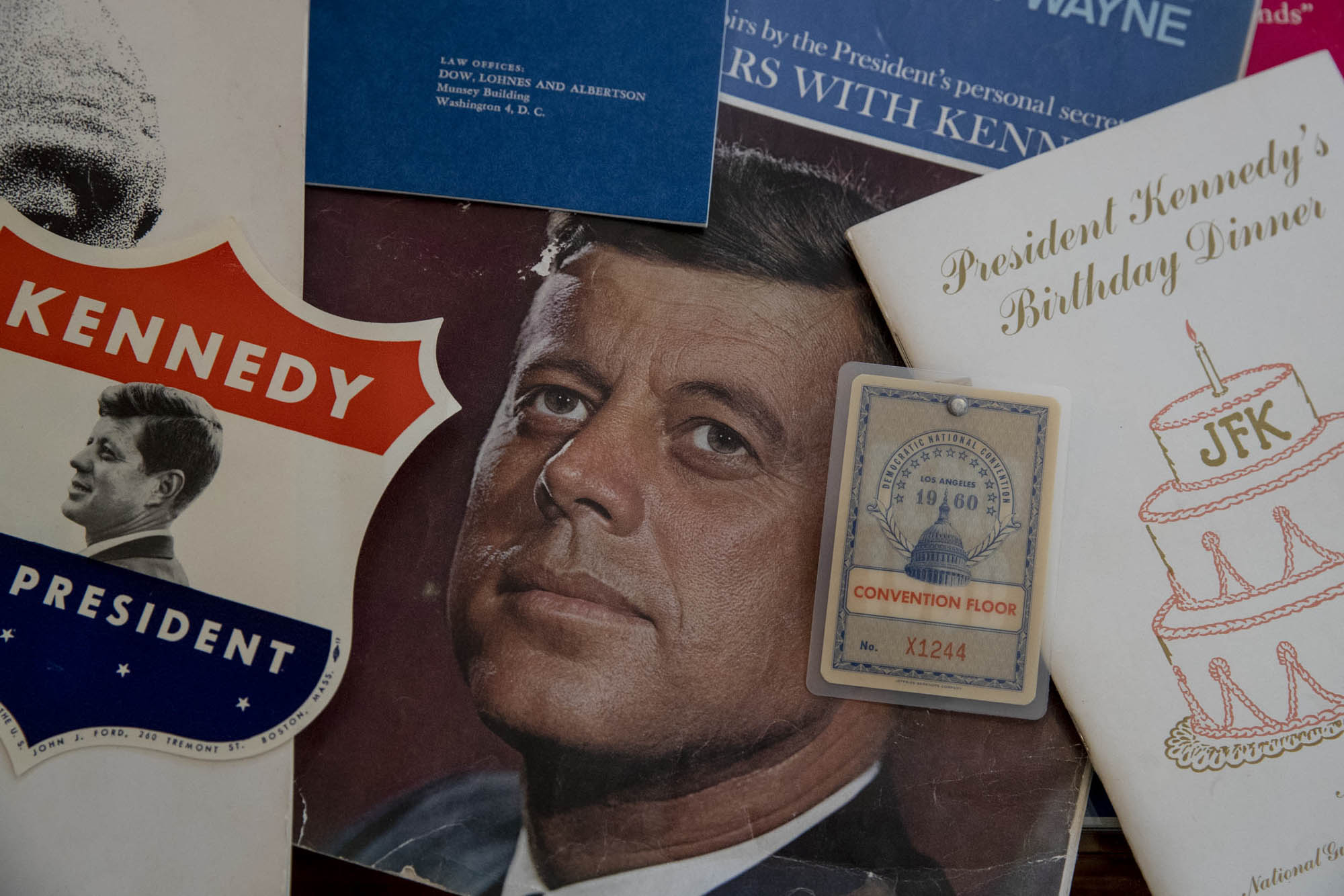
Memorabilia from John F. Kennedy’s campaign and presidency makes up a large part of the collection.
In one story, Kennedy – plagued by back problems for most of his life – was in tremendous pain right before giving a televised speech. The president could barely stand, but he did not want lean on the podium; he knew that would make him look weak. As staffers scrambled to find a solution, Christie suggested cutting the legs off the podium, making it just tall enough for Kennedy to lean on it without appearing to.
“He said Kennedy turned to him and quipped, ‘Leave it to an Army guy to solve the problem,’” Christie said.
Another favorite moment came on the campaign trail, after Kennedy won the Democratic nomination. Someone in the party told the young candidate that he pointed too much when giving speeches. Kennedy asked Christie if he agreed.
“My uncle said, ‘Senator, when you were young and running for Congress, you pointed that finger and you won. Then you ran for Senate, and you pointed that finger, and you won. Then, you ran for the nomination, and you won. If I were you, Senator, I would keep on pointing that finger,’” Christie recalled. “Kennedy got a real kick out of that.”
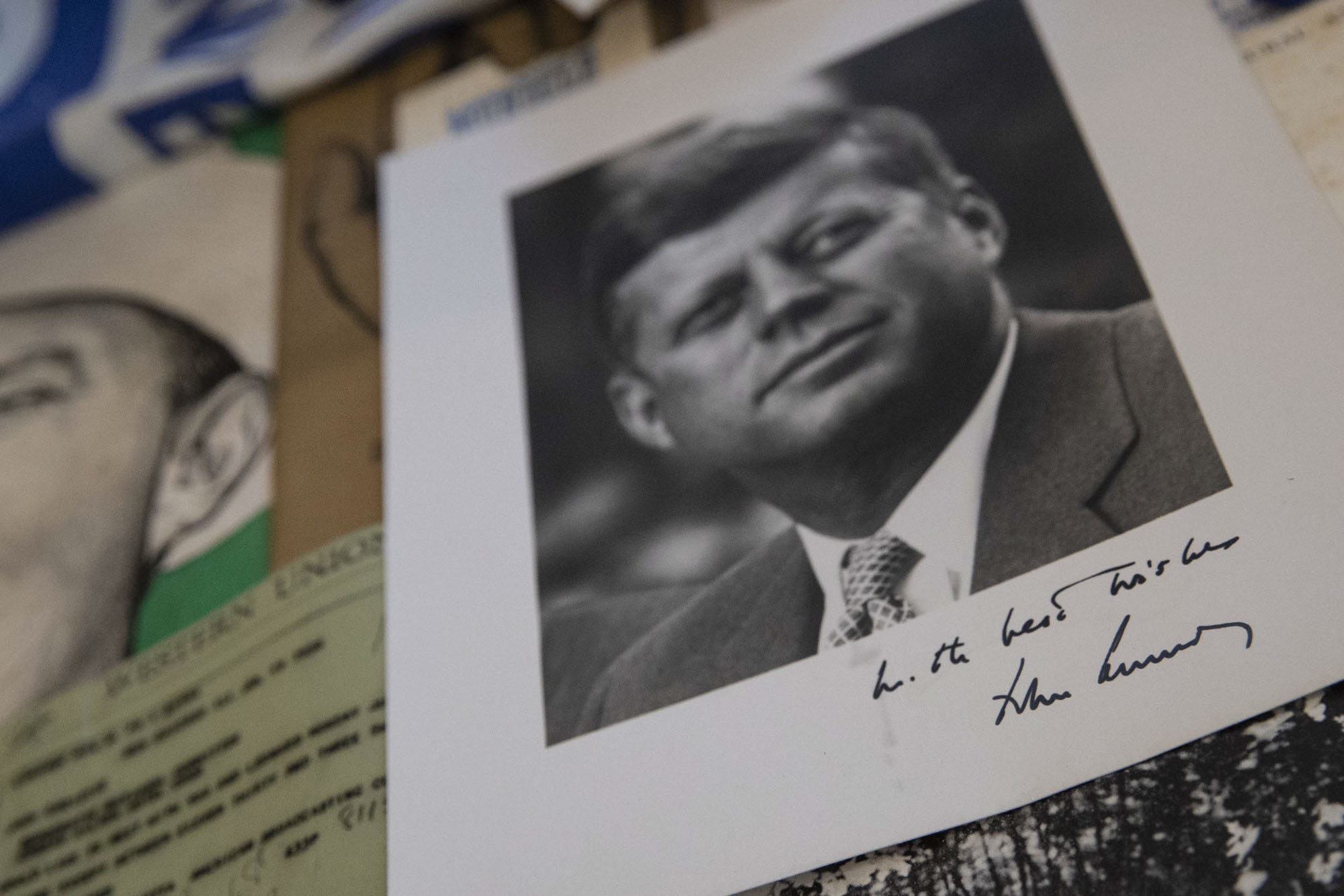
His uncle and President Kennedy, Robert Christie said, were close in age and bonded over their shared experiences in the military.
Though Christie certainly had a lot of Kennedy memorabilia, his collection dates back several years before Kennedy’s ascent, to Christie’s college years and early broadcasting career with the NBC program, “Youth Wants to Know.” The program aimed to introduce young people to key political figures of the time. Christie, who attended Syracuse University after serving in the Army Air Corps, joined its staff shortly after graduation.
“He started there, arranging for politicians to come on the show,” Christie said.
Among the collection’s photographs is one of a young Christie with Eleanor Roosevelt, taken when the first lady appeared on “Youth Wants to Know.”
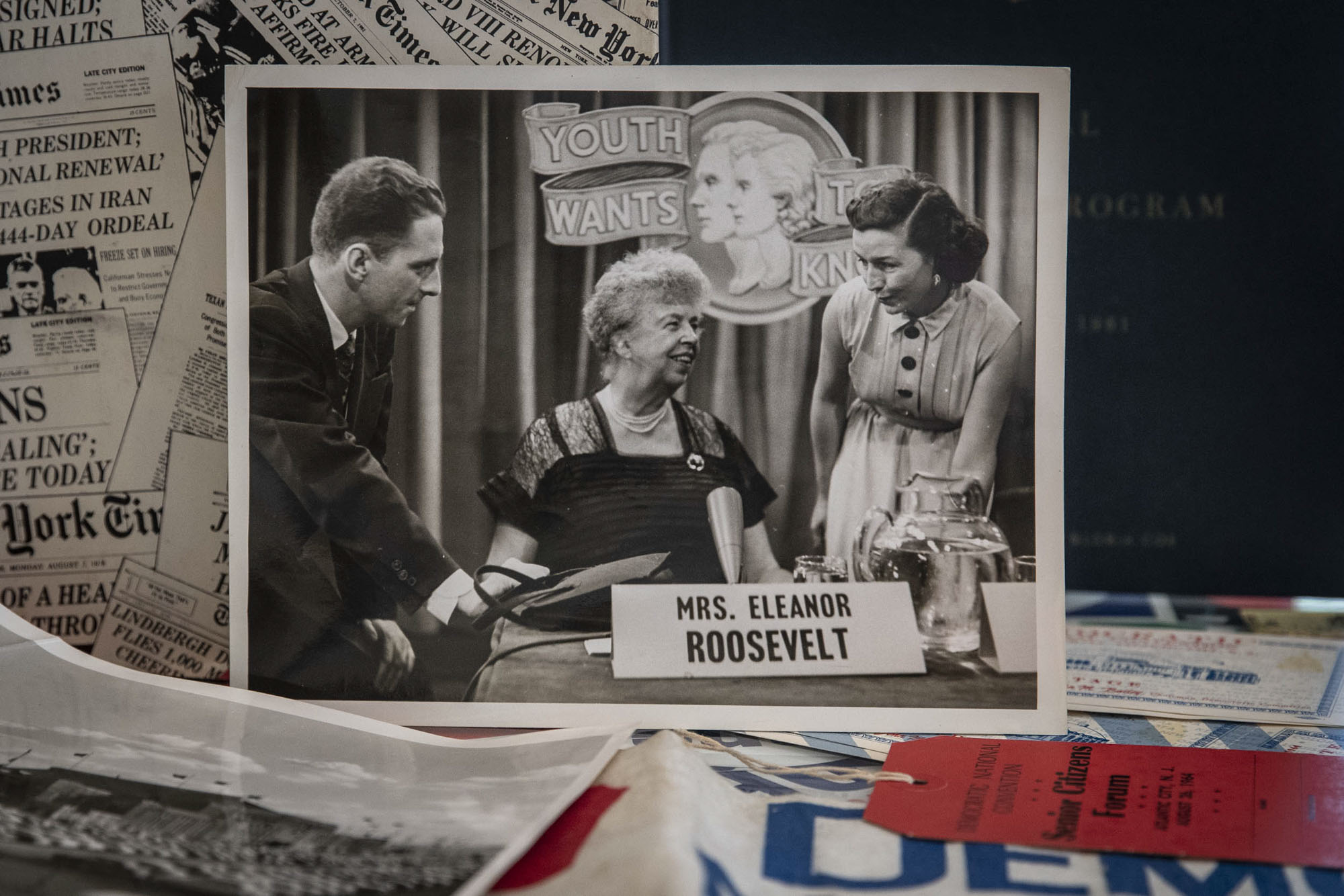
Christie, left, with Eleanor Roosevelt on the set of “Youth Wants to Know.”
The collection is not limited to the Democratic side of the aisle. Though Christie was a Democrat for a large part of his political career, his nephew said he aligned more with the Republican Party during the Ronald Reagan, George H.W. Bush and George W. Bush administrations. Then toward the end of his life, he found much to admire in another young, upstart Democrat: Barack Obama.
“He was very impressed with Obama,” Christie said, though his uncle died in February 2008, nine months before Obama won the presidency.
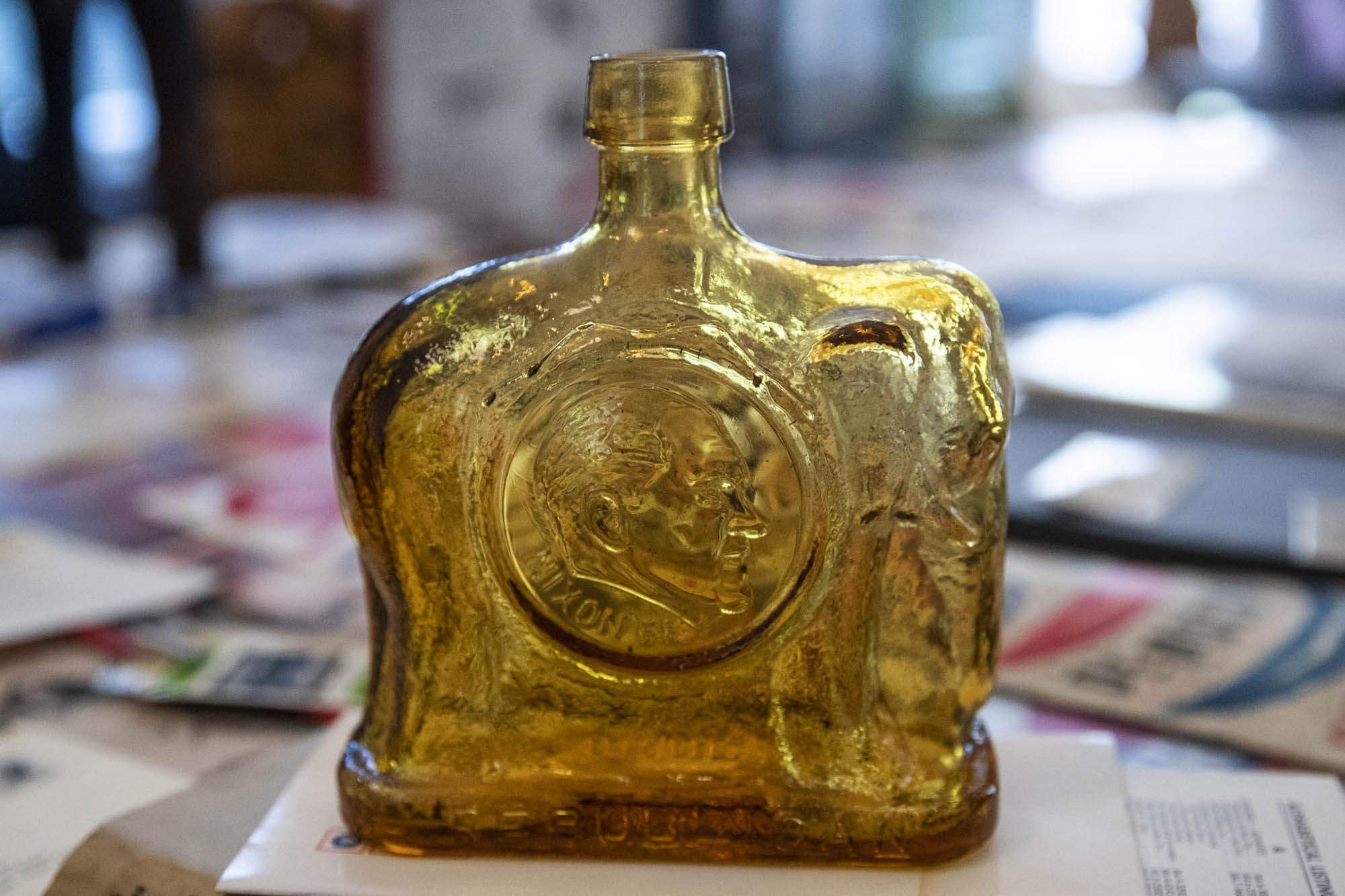
An elephant-shaped commemorative bottle, complete with the candidate’s face, issued by the Nixon campaign.
Among the artifacts in the collection are some of the more unusual items given to presidential supporters, like this commemorative bottle issued by Richard Nixon’s campaign. Supporters received it as a keepsake they could use during the campaign and keep in their home for years to come.
“The idea was for these items to be durable, not simply throwaways,” Stroupe said, pointing out that campaign finances do not allow for as many of such items now. “It takes you back to a different era, when you see how elaborate these items are.”
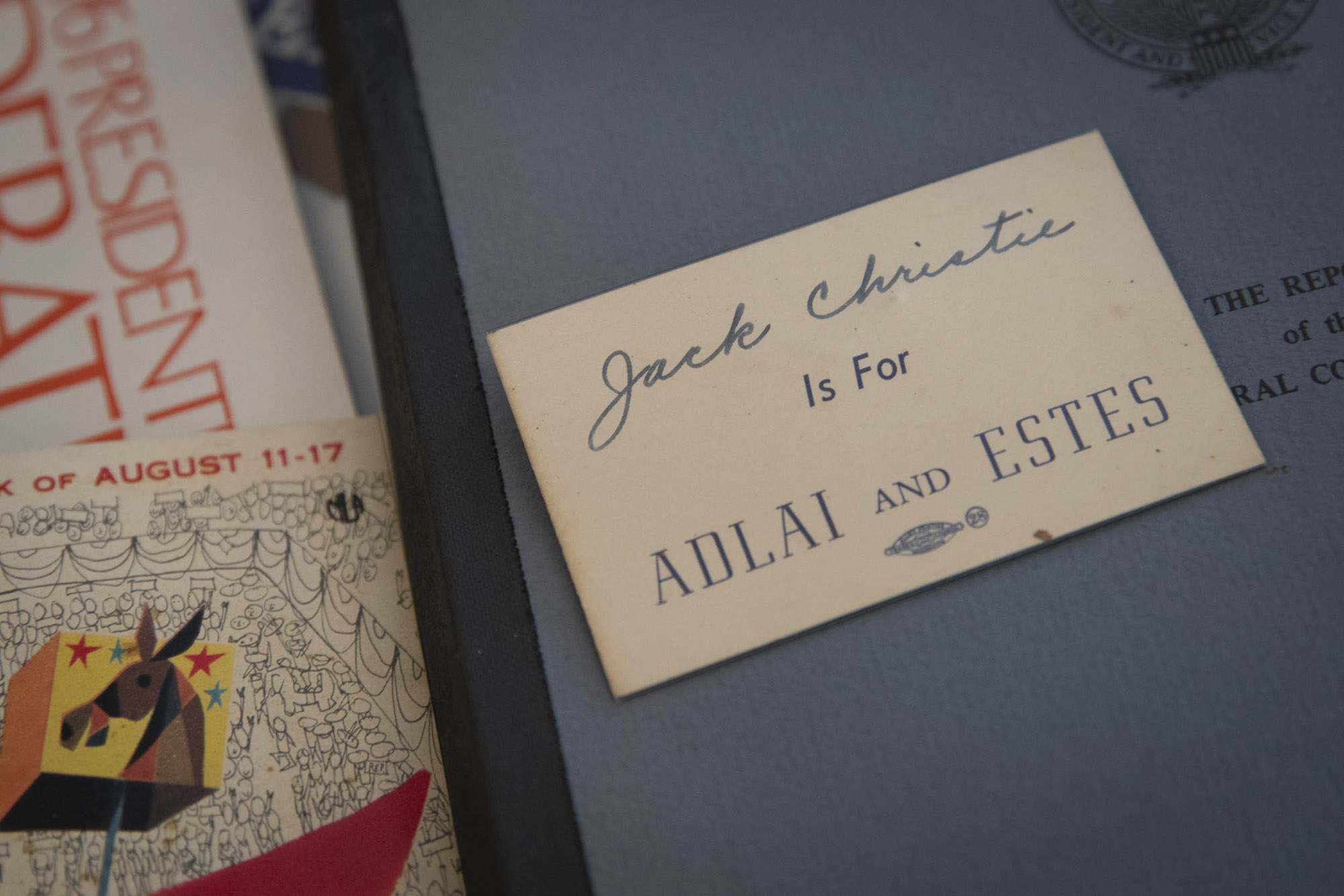
Christie’s badge from the 1956 Democratic National Convention, where the party nominated Illinois Gov. Adlai Stevenson for president and Sen. Estes Kefauver, of Tennessee, for vice president.
Stroupe hopes the collection will remind students of the grassroots nature of American politics.
“The collection reflects how important image-building is at a grassroots level,” he said. “It’s an example of grassroots politics, and how politicians worked to build an image and a name for themselves.”
As the center catalogues the collection, it will be used in classes and for public events and will also be available for research. The Center’s upcoming events include the 20th annual American Democracy Conference, to be hosted in Charlottesville this year.
“The Center for Politics is delighted to receive this impressive collection of presidential artifacts, and we’re grateful to the Christie family for their support of our ongoing work in this field,” Center Director Larry J. Sabato said in a press release. “These items, many of which are not only rare, but rarely seen, will be used – carefully – in our classes and showcased during the center’s upcoming schedule of events during the fall and spring semesters.”
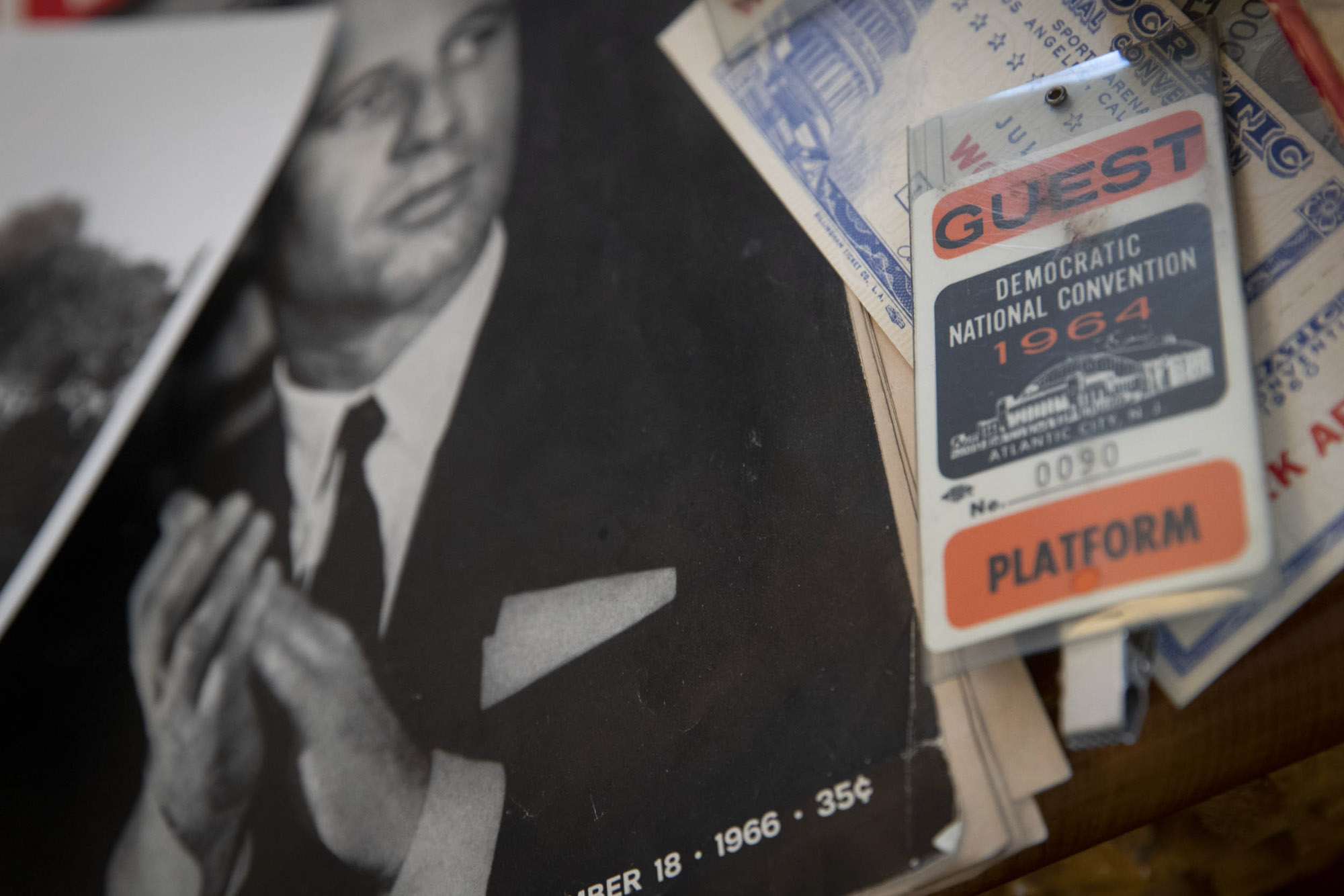
The collection features more than one Kennedy; there are several items related to Sen. Robert F. Kennedy as well.
As for the younger Christie, he is happy that so many students will have the opportunity to see and learn from the items his uncle treasured. After all, his uncle’s final request was that the collection be shared with those who would use and enjoy it.
“I felt great about giving the collection to UVA, because I felt it would fulfill what my uncle has asked,” Christie said.
Media Contact
Article Information
July 2, 2018
/content/uva-just-received-remarkable-collection-presidential-memorabilia-spanning-7-administrations

